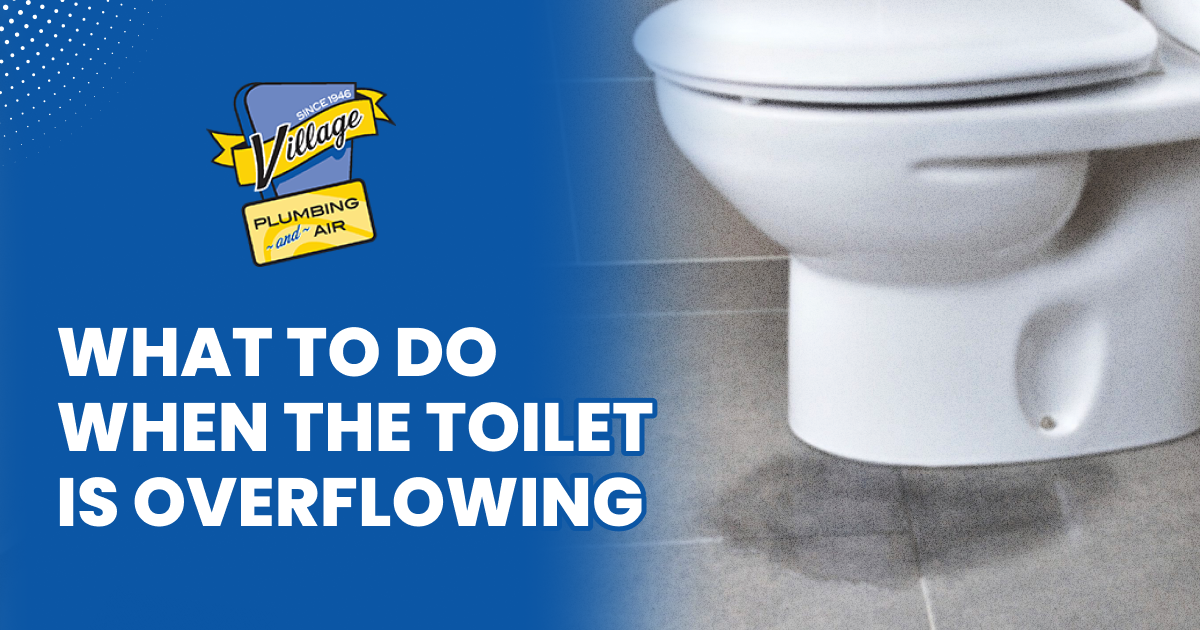When you flush the toilet, a bunch of mechanical parts let wastewater drain, clean water flow to the bowl, and the tank refill. You probably don’t think too much about how this works. But if something goes awry, the toilet overflowing is an experience you’re not likely to forget.
Panic will not help the situation. But you’re not destined to have dirty water all over your house. If the water rises and starts to overflow, here are immediate steps you need to take:
- Turn Off the Water Valve: There’s a small valve under the toilet near where it connects to the plumbing in the wall. Turn it clockwise to shut the water supply to the fixture. Whatever you do, don’t flush the toilet again. A clog is preventing the water from draining, so adding more water will just mean a bigger mess.
- Close the Flapper: Open the tank and look for a rubber circle over a drain. It’s attached to a metal lever or chain that moves it when you flush. Physically push the flapper closed to create a seal that stops water from going into the bowl.
- Secure the Float: A float cup or float ball sits on top of the water in the toilet tank. Float cups have a fill valve running through them; float balls are attached to a lever. Tie up or rig the float so it can no longer move, and water cannot continue to fill the tank.
After You Stop the Toilet Overflowing
Once you stop the flow, it may feel like an achievement, but the work isn’t over. You must remove the excess water to prevent the toilet from overflowing again. Since it won’t drain, use a cup or bucket to collect the water and pour it down the sink or bathtub drain. A wet vacuum can also be used.
You then must immediately dry the floors, or water damage can happen quickly. On a solid floor, sop up the water with towels. But if water overflows onto a carpet, fold up a dry towel and place it over the spill. Then place a heavy item on the towel and leave it there for 30 to 60 minutes. This will give it enough time to soak up the water.
If there’s waste and/or debris in the water (which is a possibility with a toilet), you need to exercise caution. It’s best to wear gloves, if you have them. Place any solids in a garbage bag and dispose of it properly. When you’re done and all excess water is cleaned up, disinfect every surface that was touched by toilet water.
Remove the Blockage
Your work area should now be safe and sanitary. Using a plunger, place the cup end over the drain at the bottom of the toilet, submerged in water. Move the plunger up and down rapidly and steadily several times. If the toilet drains, great, but if not, look for a foreign object; wearing gloves, you may be able to reach in and grab it. More difficult clogs may require a toilet snake or a professional plumber to be removed.
When to Call a Plumber
It shouldn’t take more than two or three tries to get the toilet working again. If so, there may be a more serious plumbing issue. Call for help when the toilet still won’t flush or overflows after you turn on the water supply valve and return the float to its normal position.
Contact Village Plumbing and Air
When your toilet is overflowing, Village Plumbing can troubleshoot, diagnose, and fix the underlying problem. Our licensed plumbing technicians specialize in clogged toilet repairs and other plumbing services. We respond to emergencies 24/7. Whenever your toilet is clogged or starts overflowing, call 713-526-1491 and we’ll dispatch a crew to your Houston area home to restore your toilet, safety, and peace-of-mind.
